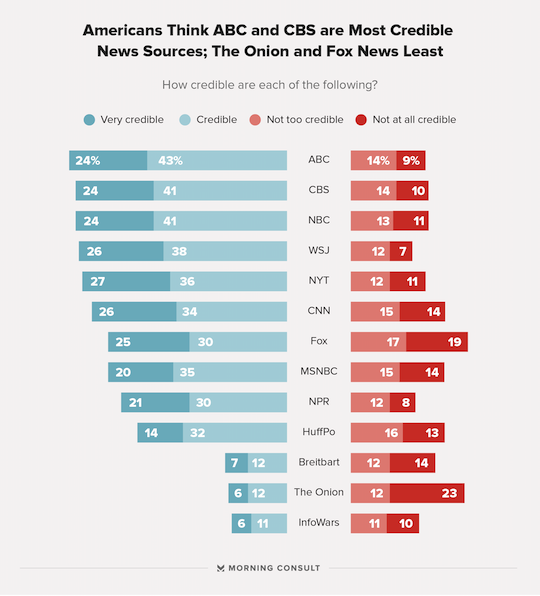“Each” is singular, you guys. The question in the poll whose results are pictured above should be “How credible is each of the following?” Informal polling finds me unpopular, still. But this formal poll from the Morning Consult brand-tracking company finds that, despite widespread abuse of the phrase “fake news,” most people still think mainstream news outlets are believable. Sixty-three percent of those polled, for example, rated The New York Times as “credible” or “very credible.” It’s kind of terrifying that a third of respondents don’t trust the longest-established journalistic institution in the United States, and the write-up suggests that this portion is larger than it has been historically. But the overall lesson to be taken from these admittedly months-old numbers is that President Trump’s gaslighting re: news has not succeeded in turning Americans against the media.
You may have noticed a more interesting nugget at the bottom of the chart, though. A combined 19 percent of poll respondents said Breitbart was a credible source for news. That’s only one point higher than the percentage of respondents who said the same thing about The Onion, an explicitly satirical venture trafficking in obviously made-up stories. The Onion beats InfoWars, which I thought was implicitly satirical until about 18 months ago. But Breitbart is a horse of a different color. It puts “news” right in its name, and its former executive chair is now the White House chief strategist. That this nominal news organization would enjoy the same credibility as The Onion is astounding, given its influence.
But here we encounter the misleading elements of polls, which are—dare I say it?—kind of fake news. You will notice that the “credible” and “not credible” numbers for these outlets don’t add up to 100 percent. The missing portion comprises people who have never heard of the outlet in question.
For instance, 42% of respondents said they had never heard of Breitbart, which is heartening. According to the crosstabs, 32% have never heard of The Onion, and another 15% said they had heard of it but had no opinion of its credibility. One presumes that a significant number of these respondents knew it it was satirical and therefore found the question of its credibility irrelevant. While we’re presuming stuff, the spike in The Onion’s credibility among 30- to 44-year-olds might be attributable to smartassery.
Anyway, The Onion and Breitbart may not be comparably trusted so much as comparably unknown. That, too, is terrifying, given the enormous popularity of one and the enormous shittiness of the other. But the larger epistemological point—that we should not take this poll to mean that people trust Breitbart about as much as they trust The Onion—holds up. Polls mislead. Also, 17% of the country has never heard of the Wall Street Journal. What a time to be alive.

